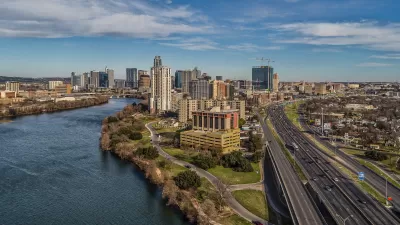Gov. Chris Christie uses a Winter Storm Jonas press conference to chastise opponents of eminent domain for statewide dune system.

Three years ago, Superstorm Sandy caused severe flooding along the entire Jersey Shore coastline that damaged some 345,000 homes and totaled nearly $30 billion in damages. As a result of the storm Gov. Chris Christie and his staff worked to find an ecological solution to better protect the residents of the Jersey Shore.
The proposed solution is a connected dune system along the 127 miles of New Jersey shoreline on the Atlantic Ocean. There's only one problem: some parcels along the proposed dune system are privately owned parcels of land. While many coastal municipalities and private landowners worked with the state to execute easements to allow the state to make the dune area part of the public domain, there are a handful of coastal towns whose voters vehemently oppose the implementation of dunes on their beaches. This fall, the Christie Administration led a crusade filing eminent domain against the holdouts, including Margate City, Point Pleasant Beach, and Mantoloking. Opposition to the state-run effort is palpable and court proceedings have effectively stalled the Army Corps of Engineers and any progress on sand dune implementation.
Claude Brodesser-Akner reported that "Gov. Christie has never minced words with those opposing his efforts to build protective sand dunes in areas hardest hit by Superstorm Sandy, and the arrival of the historic blizzard gave him the opportunity to drive the point home once more. Christie pointed to televised images of the ice floating down the streets of shore towns as exhibit 'A' in prosecuting his case against what he deemed 'selfish' home owners opposing the state-run effort."
Christie continued that his project is an "environmentally sound and necessary project" and that "it's three years post Sandy, (the project) should not be held up by what I really believe are a few very selfish homeowners who do not want to give into the idea that we have to build these dunes by using the fake excuse that somehow I want to build a boardwalk or a Ferris wheel or a hot dog stand or public bathrooms on the strip of land that we're taking. It's a ridiculous idea, put forward by some selfish folks and their selfish lawyers who are just looking to make money off this. We need to do to be able to speak to people in the public much more about this and to provide information to the court when this is ultimately litigated."
Eminent domain and private property rights are never easy planning issues, there are many sides to every story. Not many private property owners want to give up the rights to their lands, but when does the public benefit outweigh the rights of the private owner? As these cases are litigated, the answers will become clearer along the Jersey Shore. Until that time many coastal regions may be left more vulnerable to extreme flooding.
FULL STORY: Gov. Christie rips 'selfish' shore homeowners blocking dunes amid flooding

Study: Maui’s Plan to Convert Vacation Rentals to Long-Term Housing Could Cause Nearly $1 Billion Economic Loss
The plan would reduce visitor accommodation by 25,% resulting in 1,900 jobs lost.

Alabama: Trump Terminates Settlements for Black Communities Harmed By Raw Sewage
Trump deemed the landmark civil rights agreement “illegal DEI and environmental justice policy.”

Why Should We Subsidize Public Transportation?
Many public transit agencies face financial stress due to rising costs, declining fare revenue, and declining subsidies. Transit advocates must provide a strong business case for increasing public transit funding.

Paris Bike Boom Leads to Steep Drop in Air Pollution
The French city’s air quality has improved dramatically in the past 20 years, coinciding with a growth in cycling.

Why Housing Costs More to Build in California Than in Texas
Hard costs like labor and materials combined with ‘soft’ costs such as permitting make building in the San Francisco Bay Area almost three times as costly as in Texas cities.

San Diego County Sees a Rise in Urban Coyotes
San Diego County experiences a rise in urban coyotes, as sightings become prevalent throughout its urban neighbourhoods and surrounding areas.
Urban Design for Planners 1: Software Tools
This six-course series explores essential urban design concepts using open source software and equips planners with the tools they need to participate fully in the urban design process.
Planning for Universal Design
Learn the tools for implementing Universal Design in planning regulations.
Smith Gee Studio
Alamo Area Metropolitan Planning Organization
City of Santa Clarita
Institute for Housing and Urban Development Studies (IHS)
City of Grandview
Harvard GSD Executive Education
Toledo-Lucas County Plan Commissions
Salt Lake City
NYU Wagner Graduate School of Public Service





























